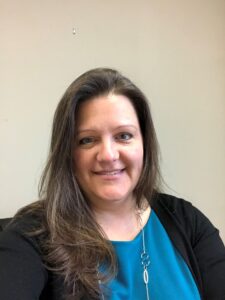
We sat down with YRJ Staff Attorney Jennifer Stoller to discuss her work and what being at YRJ over the last nine years means to her.
What made you want to be a lawyer?
When I was in college, my mom became a foster parent. I was an adult at home for the summer, and I did some supervised visits for the first two kids that we fostered.
There were things about the kids’ case that could have been resolved sooner, and those kids could have gone home sooner. But it took longer than it should have for DHS to put those pieces together. I thought that kids like them need someone representing them. I didn’t think the system was doing that. That experience got me thinking about law school. I come from a family of farmers and teachers and it has always been important to me to have a service-oriented career.
How would you summarize what you do?
Half of my time is spent on trial level public defender work and the other half on the Family Defense Project (FDP). I also work on Special Immigrant Juvenile Status (SIJS) cases.
The FDP is early defense work or pre-petition work. Early defense work is gaining traction across the country. [FDP gets involved when children may be in danger of being removed from a home, but prior to a petition being filed with the court for their removal.]
With FDP, we are asking “how do we resolve this family’s challenges before DHS takes them to court?” If the court becomes involved in Multnomah County, our informal data collection shows that approximately 90% of kids are removed from their families. If we want to prevent removal, we have to start earlier. We can’t always avoid court, but we’re better able to prevent removal if we get involved earlier. When the children are removed, that’s when the real trauma happens for them. With the FDP, we are anticipating legal problems that we can work on before DHS becomes involved.
We often meet with a client and DHS to figure out what DHS’s concerns are so we can address these things before the court becomes involved. So many parents have their own trauma from being involved with DHS as children. DHS involvement itself is a trauma trigger for them, making it difficult for parents to work with DHS on their own.
Having Olivia and I [Olivia Vo, YRJ Family Engagement Specialist] in the room with the client, we can serve as a buffer and get the client help when their trust has been broken with DHS. We are able to provide dignity, support, and independent confidential advice about a client’s options. And make the process a little less traumatic.
The fact that we can offer that confidential independent advice is crucial. One client said, “this program is a godsend to people.” FDP is developing relationships with DHS workers and community organizations. We haven’t received many referrals from DHS yet [the program just began in June] but we are in good talks with them right now around referrals. As a result, we’ve sought out community partners for referrals.
We do this by showing up to a lot of community organization meetings on a regular basis. Project Nurture is one such organization. It is a program that employs nurse practitioners, social workers, and others at hospitals to work with pregnant people with substance abuse disorders. An example of this relationship in action: Project Nurture got connected with a mother recently, then was able to call me the same day and make the referral. I went to the hospital the next morning, checked for conflicts with ongoing representation, then was able to offer our services, free of charge, to this mother who was in danger of losing her baby. We were able to work with DHS to establish an in-home safety plan.
On the Special Immigrant Juvenile Status (SIJS) cases, Immigration Counseling Services contacts our offices to screen youth in immigration detention to see if they qualify for juvenile representation. All of the kids that we accept have been abused, neglected, or abandoned by both parents in their home country. Their situation in their home country is such that they undertook a dangerous journey to get here. Clients have been raped, assaulted, separated from their parents on the journey, and some have no idea what happened to their parents. Historically, they were almost all from Central America. But we’ve also seen more children from other countries in the last five years. These teens are among the most resilient people I have ever met.
We file a petition in court to initiate a juvenile court case, and get a court order that Immigration Counseling Services uses to file for the SIJS visa for these children. We often ask for the youth to be placed in foster care, and we’ve developed good relationships with DHS SIJS teen workers. We’ve grown this relationship over 15 years of doing this work.
What makes you want to stay at YRJ?
The incredible community and bond: first and foremost, the other lawyers that I work with have my back. There is constant collaboration and support. Then there’s staff like Leticea [Leticea Cruz, YRJ Legal Assistant] who just last week jumped into a meeting, and arranged for a client to meet with me, while I was in a preliminary hearing. That level of support keeps me here. We are all at YRJ because we are committed to this work.
.